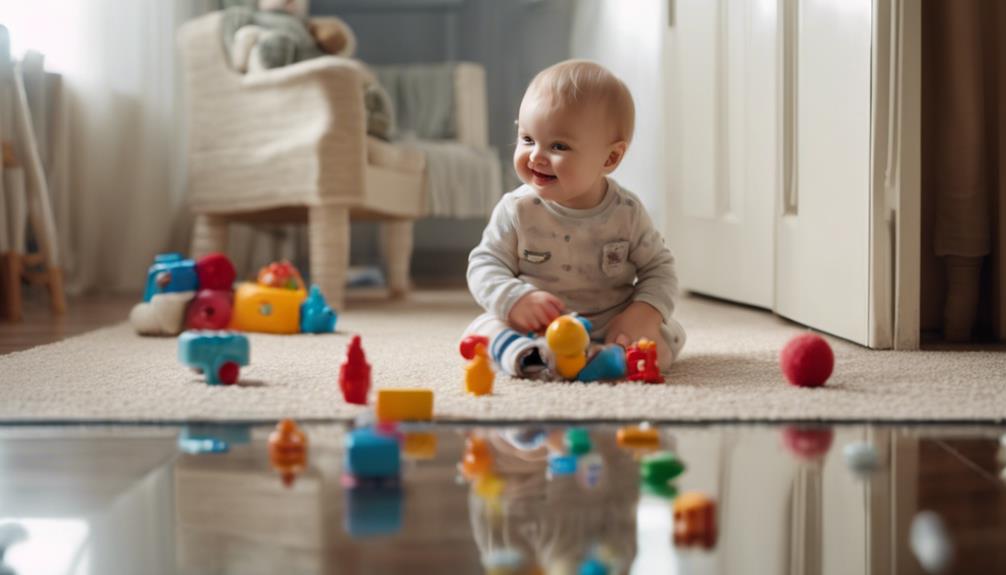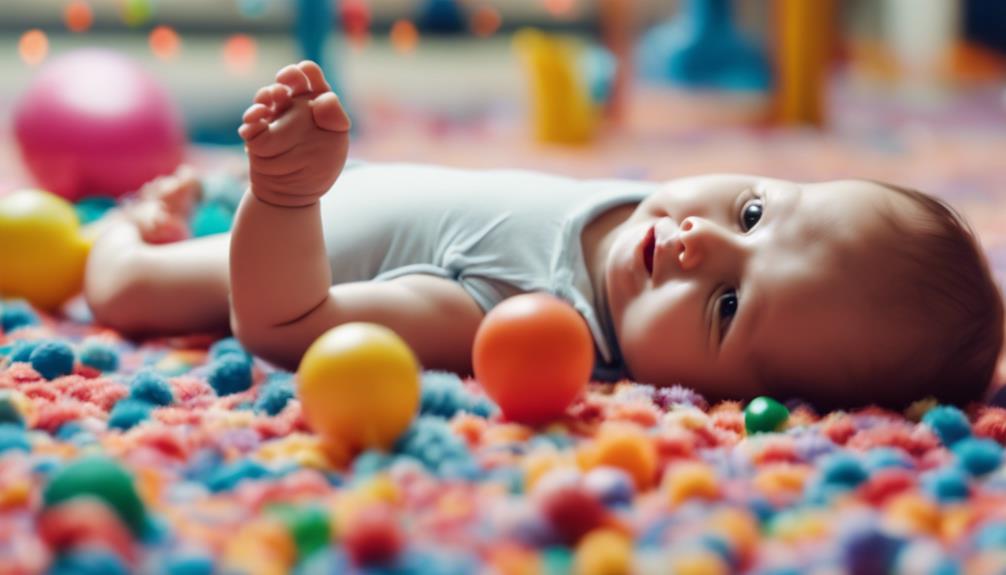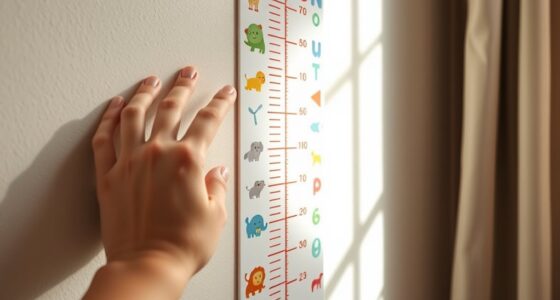Your 6-month-old baby is developing social skills by recognizing faces, reacting to emotions, and enjoying games like peek-a-boo. Engage in turn-taking play interactions, maintain eye contact, and encourage imitation of actions and expressions to foster trust and connection. Positive social experiences, such as interactive play and introducing familiar faces, support social engagement. Form attachments by responding to their emotions and cues. Smiling, cooing, and babbling are forms of communication that express joy and aid in social interactions. Respond to social cues like familiar faces and interaction interests. Further insights into their social growth await.
Key Takeaways
- 6-month-old babies show interest in social interactions and preferences.
- Caregiver responsiveness, eye contact, and turn-taking play interactions are crucial.
- Imitation of actions and expressions aids in communication and connection.
- Encourage positive social experiences like interactive play and peek-a-boo.
- Babies form attachments through recognition of familiar faces and responding to social cues.
Social Interactions and Preferences
By 6 months old, your baby begins to show a significant interest in social interactions and preferences. This marks an exciting developmental milestone as your little one starts recognizing familiar faces and delights in interacting with family members.
At this age, babies also exhibit signs of self-awareness by showing interest in their own reflection in the mirror. Additionally, they begin responding to the emotions of others, expressing their own happiness or displeasure through various sounds.
Peek-a-boo becomes a beloved social game for many 6-month-olds, showcasing their enjoyment in playful interactions. Furthermore, babies may start displaying preferences for specific toys, activities, or individuals, signaling the emergence of social bonds.
These early social interactions and preferences lay an important foundation for your baby's future social development and relationships. Encouraging and nurturing these behaviors can further enhance your baby's social skills and emotional intelligence as they continue to grow and explore the world around them.
Caregiver Responsiveness and Engagement

To promote strong caregiver responsiveness and engagement with your 6-month-old baby, remember the importance of eye contact during interactions. Establishing eye contact helps create a connection and aids in building a sense of trust and security for your little one.
Additionally, engaging in turn-taking play interactions, such as peek-a-boo or imitating your baby's sounds, can enhance social development and strengthen the bond between you and your child.
Eye Contact Importance
Engaging in eye contact with your 6-month-old baby is vital for fostering trust and nurturing emotional connections during this critical stage of development. At this age, babies start to reach emotional milestones and development milestones through eye contact with caregivers. They use eye contact to seek reassurance, comfort, and engage in social interactions.
Your responsiveness to your baby's eye contact plays a significant role in promoting secure attachment and healthy social development. Through eye contact, babies learn about non-verbal communication cues and develop essential social skills. Encouraging eye contact with your 6-month-old supports their emotional regulation and overall well-being.
Turn-Taking Play Interactions
Prompt caregiver responsiveness in turn-taking play interactions with your 6-month-old baby to enhance their social development and strengthen your bond. During these interactions, it's essential to observe and respond promptly to your baby's cues, such as babbling, gestures, or signs of excitement. By engaging in turn-taking play, you aren't only fostering a sense of security and trust in your baby but also helping them learn conversational patterns and develop essential communication skills. Caregiver responsiveness in these interactions plays a significant role in supporting your baby's social development.
As you engage in turn-taking play with your baby, remember to maintain a positive and encouraging demeanor. Encourage your baby's initiatives by responding promptly and enthusiastically, creating a supportive environment for their social growth. These interactions not only benefit your baby's development but also strengthen the bond between you and your child. By actively participating in turn-taking play interactions, you're laying a foundation for healthy social development and nurturing a strong connection with your 6-month-old.
Imitation of Actions and Expressions

At around 6 months old, your baby may begin to imitate simple actions and expressions, like sticking out their tongue or clapping their hands.
This imitation process is essential for your baby's social development as it helps them learn how to engage with the world around them.
Mimicking Facial Expressions
Babies at 6 months old begin mimicking facial expressions as a way to communicate and connect with others. This imitation of actions, like sticking out their tongue or smiling, is an essential aspect of their social development. By mirroring the facial gestures and expressions of those around them, infants display a growing social awareness and the ability to reflect emotions.
Through observing and copying these facial cues, babies learn to navigate social interactions with caregivers and peers. Mimicking facial expressions serves as a fundamental building block for understanding non-verbal communication and forming connections with others. It's a significant step in their journey towards developing social skills and establishing relationships.
This ability to imitate facial expressions not only showcases their cognitive abilities but also indicates a deepening understanding of the social world that surrounds them. As babies engage in this mirroring behavior, they lay the groundwork for more complex social interactions in the future.
Copying Hand Movements
Encouraging your infant to mimic hand movements supports their social development and fosters early communication skills. At around 6 months, babies begin to exhibit imitation behavior by copying gestures they observe. This milestone marks the start of their ability to imitate actions and expressions, an essential aspect of social development.
You may notice your baby mimicking activities like clapping, waving, or pointing, showcasing their growing social awareness. By imitating hand movements, babies learn about communication and social interactions, laying the foundation for future social skills. It's essential to positively reinforce and praise your baby when they imitate these gestures, as this encouragement can further enhance their social development.
Through copying hand movements, infants not only engage in playful activities but also begin to grasp the intricacies of social communication, setting the stage for more complex interactions as they continue to grow and learn.
Observing Caregiver Interactions
By observing caregiver interactions, your 6-month-old baby learns to imitate actions and expressions, fostering social development and strengthening bonds. This imitation of actions such as clapping hands or waving, and mirroring facial expressions like smiling or frowning in response to your emotions, showcases your baby's growing ability to connect and communicate with others. Encouraging interactive activities that involve imitation can further enhance this developmental milestone. As your baby recognizes familiar faces and starts making sounds to interact with caregivers, the bond between you deepens. Engaging in these imitation behaviors not only aids in social development but also lays the groundwork for future communication skills. Below is a table showcasing some common caregiver interactions your baby may imitate:
| Caregiver Interaction | Baby's Imitation | Developmental Benefit |
|---|---|---|
| Clapping hands | Mimicking claps | Motor skill refinement |
| Smiling at the baby | Smiling back | Emotional connection |
| Waving goodbye | Attempting to wave | Social interaction |
Foundation for Future Social Interactions

Establishing early social connections at 6 months sets the stage for future interactions and relationships in a baby's life. At this age, your little one begins to reach emotional milestones that form the foundation for their social development.
Recognizing familiar faces and responding to different emotional cues are key aspects of this stage. Your baby's interest in playing with others, especially family members, fosters social bonding through simple games like peek-a-boo.
In addition, the enjoyment babies derive from looking at themselves in the mirror indicates the early development of self-awareness and social cognition.
Encouraging Positive Social Experiences

Fostering positive social experiences for your 6-month-old involves actively engaging in interactive play and nurturing their social connections. Encourage development by participating in activities like peek-a-boo or singing nursery rhymes, engaging in back-and-forth interactions that promote social skills.
Create opportunities for your baby to interact with familiar faces, strengthening social bonds and recognition within their environment. Introduce your baby to their reflection in a mirror, aiding in the development of self-awareness and understanding social cues.
Respond consistently to your baby's emotions and expressions, building trust and security in social interactions. By providing a safe and nurturing environment that supports social development, you create a positive and loving atmosphere for your baby's interactions.
Through these actions, you lay the foundation for healthy social development, helping your 6-month-old navigate the world with confidence and a sense of connection.
Forming Attachments and Connections

Developing strong attachments and forming meaningful connections are crucial milestones for your 6-month-old baby's social growth and emotional well-being. At this age, your baby starts to form strong bonds with familiar caregivers, showing preferences for certain individuals. They begin recognizing familiar faces and may display separation anxiety when apart from primary caregivers. Responding to emotions and cues from caregivers helps your baby develop trust and security in relationships. Interactive play, such as peek-a-boo and social games, is enjoyable for 6-month-olds and fosters social interactions. The table below summarizes key points about forming attachments and connections:
| Milestones in Forming Attachments and Connections |
|---|
| Showing preferences for familiar caregivers |
| Recognizing familiar faces |
| Displaying separation anxiety when apart from primary caregivers |
These behaviors lay the foundation for future social interactions and strengthen the bond between you and your baby.
Smiling, Cooing, and Babbling

By 6 months, your baby typically engages in smiling, cooing, and babbling to communicate and interact with others, showcasing their growing social awareness and communication skills. This stage marks a significant development in your baby's ability to express joy and engage in vocal exchanges with you.
The smiles and laughter your baby shares in response to interactions demonstrate their enjoyment and understanding of social interactions. Cooing and babbling become more pronounced as your baby starts to mimic sounds and gestures observed in their environment, illustrating their essential communication abilities. This vocal play is a vital step in developing language skills and forming connections with caregivers.
Additionally, your baby may display an interest in social play, enjoying games like peek-a-boo and turn-taking with sounds. These interactions not only foster a sense of bonding but also lay the foundation for future social skills and relationships. Embrace these moments of smiling, cooing, and babbling as your baby explores the world of social communication.
Responding to Social Cues

When your 6-month-old baby responds to social cues, they demonstrate their emerging ability to engage with others and form connections based on shared emotions and interactions. At this stage, your baby can recognize familiar faces and may show interest in interacting with them.
They respond to social cues such as smiling, laughing, and babbling in response to others' emotions, signaling their growing social awareness. Engaging in activities like peek-a-boo can bring about excitement in your baby as they enjoy playful interactions.
Additionally, babies may start displaying attachment behaviors towards primary caregivers, seeking comfort and reassurance from them. Responding positively to your baby's social cues is vital as this can help strengthen the bond between you and your little one.
Frequently Asked Questions
What Are the Social Skills of a 6 Month Old?
You recognize familiar faces and enjoy playing with others, showing joy and responding to emotions around you. Looking in the mirror brings delight, and using sounds to express feelings helps develop your social skills at 6 months.
What Are Social Emotional Milestones for a 6 Month Old?
You're curious about social emotional milestones for a 6-month-old. They recognize faces, enjoy games, show self-awareness in mirrors, respond to emotions, and start interacting with others. These early skills pave the way for deeper social connections.
What Is the Social and Emotional Development of a 6 9 Month Old Baby?
You're diving into the world of social and emotional development with your 6-month-old. They'll charm you with their contagious joy, recognizing faces and even enjoying simple games. Responding to their emotional cues is key to nurturing their social growth.
What Developmental Stage Is a 6 Month Old In?
You are currently in a stage where you are starting to differentiate between familiar faces and strangers. Enjoy playing with others, peek-a-boo being a favorite. Showing interest in looking at yourself in the mirror, a sign of developing self-awareness.
Conclusion
Just like a tiny seed growing into a blooming flower, a 6-month-old baby is laying the foundation for future social interactions.
Through engaging with caregivers, imitating actions, and forming attachments, they're developing the skills needed to navigate the world around them.
By encouraging positive social experiences and responding to social cues, parents can support their little one's social development and help them blossom into confident and connected individuals.










